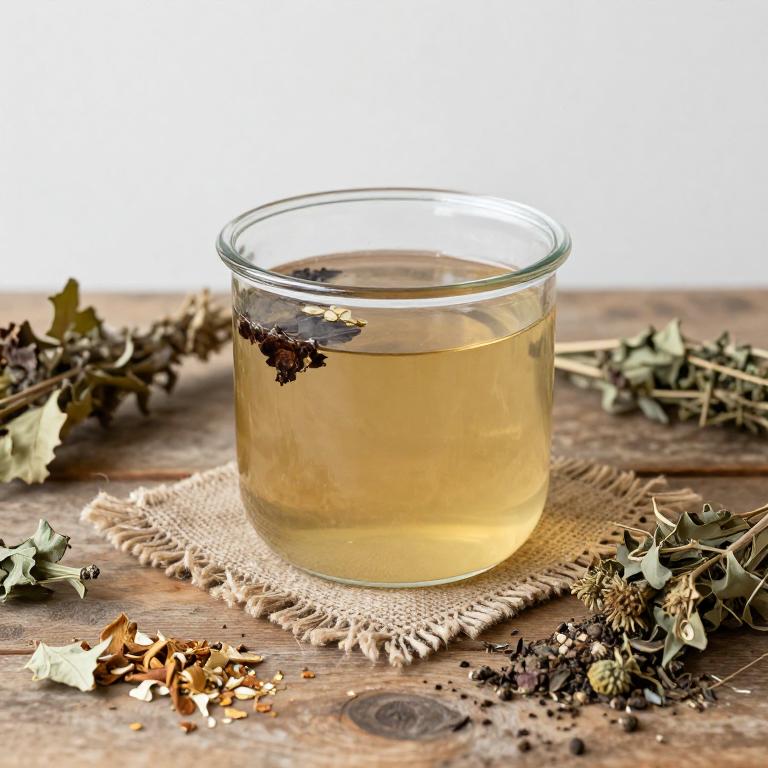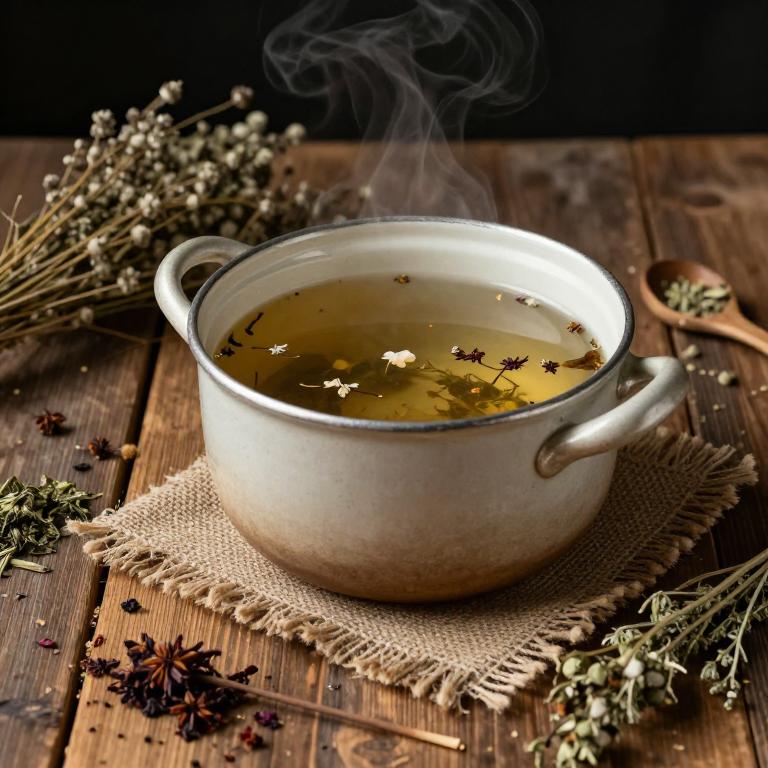10 Best Herbal Decoctions For Stomach Cramps

Herbal decoctions have been traditionally used to alleviate stomach cramps by soothing the digestive system and reducing inflammation.
Commonly used herbs include ginger, peppermint, and chamomile, which are known for their antispasmodic and calming properties. To prepare a decoction, these herbs are typically simmered in water for an extended period to extract their active compounds. This method allows for the gentle release of beneficial compounds that can ease gastrointestinal discomfort.
While herbal decoctions can be effective, it is important to consult with a healthcare provider, especially for persistent or severe cramps, to ensure safety and proper treatment.
Table of Contents
- 1. Ginger (Zingiber officinale)
- 2. Fennel (Foeniculum vulgare)
- 3. Cumin (Cuminum cyminum)
- 4. Turmeric (Curcuma longa)
- 5. Black pepper (Piper nigrum)
- 6. Thistle (Silybum marianum)
- 7. Caraway (Carum carvi)
- 8. Licorice (Glycyrrhiza glabra)
- 9. Peppermint (Mentha piperita)
- 10. Stinging nettle (Urtica dioica)
1. Ginger (Zingiber officinale)

Zingiber officinale, commonly known as ginger, has been widely used in herbal medicine for its ability to alleviate stomach cramps.
Ginger contains bioactive compounds such as gingerol and shogaol, which possess anti-inflammatory and antispasmodic properties that help relax the gastrointestinal muscles. Herbal decoctions made from fresh or dried ginger root can be prepared by simmering the root in water for several minutes, allowing the active compounds to infuse into the liquid. These decoctions are often consumed warm to soothe the digestive system and reduce discomfort caused by gas, indigestion, or menstrual cramps.
Due to its natural efficacy and minimal side effects, ginger decoctions are a popular remedy for mild to moderate stomach cramps in both traditional and modern herbal practices.
2. Fennel (Foeniculum vulgare)

Foeniculum vulgare, commonly known as fennel, has been traditionally used in herbal medicine to alleviate stomach cramps due to its carminative and antispasmodic properties.
A decoction of fennel seeds or leaves can be prepared by simmering them in water for several minutes, allowing the active compounds to dissolve into the liquid. This herbal remedy is believed to help relax the smooth muscles of the gastrointestinal tract, reducing cramping and bloating. It is often recommended for digestive discomfort, especially in cases of colic or gas-related pain.
However, it is important to consult a healthcare provider before use, particularly for individuals with existing medical conditions or those taking other medications.
3. Cumin (Cuminum cyminum)

Cuminum cyminum, commonly known as cumin, has been traditionally used in herbal medicine to alleviate stomach cramps due to its carminative and antispasmodic properties.
When prepared as a herbal decoction, cumin seeds are boiled in water to extract their essential oils and active compounds, which help relax the smooth muscles of the gastrointestinal tract. This preparation can soothe digestive discomfort and reduce the frequency and intensity of cramps by improving digestion and reducing gas accumulation. The decoction is often consumed warm, either on its own or combined with other herbs like ginger or fennel for enhanced efficacy.
However, individuals with certain medical conditions or those on medication should consult a healthcare provider before using cumin-based remedies.
4. Turmeric (Curcuma longa)

Curcuma longa, commonly known as turmeric, has been traditionally used in herbal medicine for its anti-inflammatory and analgesic properties.
Herbal decoctions made from the rhizomes of Curcuma longa are often prepared by boiling the dried roots in water to extract its active compounds, such as curcumin. These decoctions are believed to help alleviate stomach cramps by reducing inflammation and relaxing gastrointestinal muscles. The warming properties of turmeric may also aid in soothing the digestive tract and promoting digestion.
However, while some studies suggest potential benefits, it is important to consult a healthcare professional before using turmeric decoctions, especially for prolonged or severe stomach issues.
5. Black pepper (Piper nigrum)

Piper nigrum, commonly known as black pepper, has been traditionally used in herbal medicine for its potential to alleviate stomach cramps.
The active compound, piperine, is believed to possess anti-inflammatory and analgesic properties that may help reduce gastrointestinal discomfort. When prepared as a herbal decoction, black pepper can be consumed to soothe the digestive system and ease spasms. To make the decoction, whole or crushed black pepper is boiled in water and allowed to steep for several minutes.
However, it is important to consult a healthcare professional before using black pepper decoctions, especially for individuals with existing digestive conditions or those taking medications.
6. Thistle (Silybum marianum)

Silybum marianum, commonly known as milk thistle, has been traditionally used in herbal medicine for its potential digestive benefits.
Its herbal decoctions are often prepared by simmering the dried seeds or leaves in water to extract the active compounds, such as silymarin. These decoctions may help alleviate stomach cramps by reducing inflammation and supporting liver function, which can indirectly improve digestion. Some studies suggest that silymarin has antioxidant and anti-inflammatory properties that may soothe gastrointestinal discomfort.
However, while preliminary research is promising, more clinical trials are needed to fully establish its efficacy and safety for treating stomach cramps.
7. Caraway (Carum carvi)

Carum carvi, commonly known as caraway, has been traditionally used in herbal medicine for its soothing effects on the digestive system.
A caraway herbal decoction is prepared by simmering the dried seeds in water, allowing the active compounds such as thymol and limonene to infuse into the liquid. This decoction is often recommended for relieving stomach cramps due to its carminative and antispasmodic properties. The warming effect of the decoction helps to ease gastrointestinal discomfort and promote digestion.
Regular consumption of caraway decoction may provide natural relief for mild digestive issues, though it is advisable to consult a healthcare professional before use, especially for prolonged or severe symptoms.
8. Licorice (Glycyrrhiza glabra)

Glycyrrhiza glabra, commonly known as licorice root, has been traditionally used in herbal medicine for its potential therapeutic effects on the gastrointestinal system.
Herbal decoctions made from licorice root are often prepared by simmering the dried root in water to extract its active compounds, including glycyrrhizin, flavonoids, and saponins. These compounds may help soothe inflammation and irritation in the stomach lining, making licorice root decoctions a popular remedy for alleviating stomach cramps and digestive discomfort. However, long-term use of licorice root can lead to side effects such as hypertension and potassium deficiency due to its effects on the adrenal glands.
As a result, it is advisable to consult a healthcare professional before using licorice root decoctions for persistent stomach issues.
9. Peppermint (Mentha piperita)

Mentha piperita, commonly known as peppermint, is widely used in herbal decoctions to alleviate stomach cramps due to its soothing and antispasmodic properties.
When prepared as a decoction, peppermint leaves are simmered in water to release essential oils and active compounds such as menthol and methyl salicylate, which help relax the smooth muscles of the gastrointestinal tract. This relaxation can reduce the intensity and frequency of cramping, making it beneficial for conditions like irritable bowel syndrome or digestive discomfort. The mild, cooling effect of peppermint decoctions also helps ease nausea and bloating associated with stomach issues.
However, it is important to consult a healthcare professional before using peppermint decoctions, especially for individuals with certain medical conditions or those taking medications.
10. Stinging nettle (Urtica dioica)

Urtica dioica, commonly known as stinging nettle, has been traditionally used in herbal medicine for its potential digestive benefits.
When prepared as a decoction, the leaves and stems of Urtica dioica are boiled to extract their active compounds, which may help alleviate stomach cramps. This herbal decoction is believed to have anti-inflammatory and antispasmodic properties that can soothe gastrointestinal discomfort. It is often recommended for individuals experiencing mild digestive issues or spasms.
However, it is important to consult with a healthcare professional before using Urtica dioica, especially for those with existing medical conditions or who are pregnant.